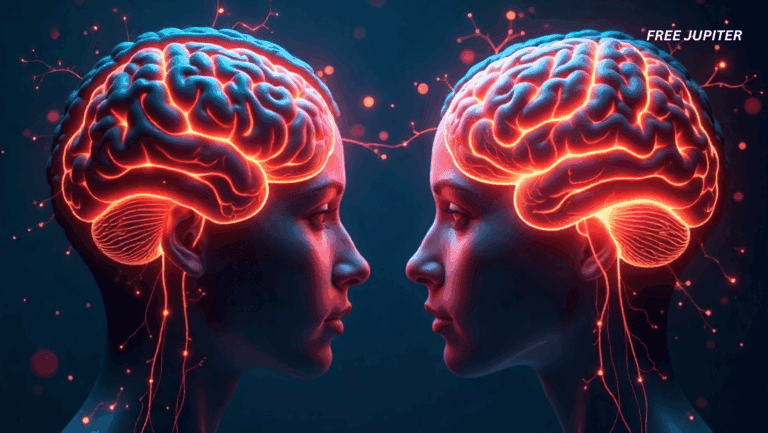When you think of creatine, your mind probably jumps to bodybuilders, gym sessions, or those giant tubs of powder lining fitness store shelves. It’s long been branded as the go-to supplement for building muscle and improving athletic performance. But beneath its muscular reputation lies a fascinating and often overlooked fact: creatine is essential not just for biceps, but for your brain—and it may play a life-saving role for some people.
The Unsung Brain Hero Hiding in Your Protein Shake
Let’s start with what creatine actually does. It’s a naturally occurring compound that helps produce energy in the body. More specifically, it helps generate ATP (adenosine triphosphate)—think of it as your cells’ energy coin, spent every time your body moves, thinks, or breathes. Without enough ATP, your cells can’t function efficiently. While muscle cells gobble up a lot of energy, your brain is an even bigger energy hog. In fact, the brain makes up just about 2% of your body weight but consumes roughly 20% of its energy.
This means the brain needs a steady supply of creatine to keep things running smoothly. Not just for thinking and memory, but also for neurochemical balance, brain development, and protection against overexcitement in the nervous system—which can trigger seizures, among other problems.
Creatine’s Hidden Role in Mental Health and Brain Chemistry
What’s really intriguing is how creatine isn’t just about making energy. Researchers now believe that it also influences brain signaling, affecting neurotransmitters—the chemical messengers that help neurons talk to one another. One of these is GABA (gamma-aminobutyric acid), the brain’s main “calm-down” chemical. GABA works as a brake in the brain, preventing neurons from firing too rapidly or out of control. Creatine appears to play a supporting role here by regulating how GABA and other neurotransmitters function.
And it gets even more interesting: some scientists believe creatine might function like a neurotransmitter itself. It’s passed from supporting brain cells (glial cells) to neurons and appears to help shape how brain cells communicate. This suggests that creatine isn’t just a fuel booster—it may also be involved in shaping your thoughts, mood, memory, and even how you learn.
Read more: This Is What Happens to Your Body When You Eat Too Many Strawberries: Science
The Devastating Effects of Creatine Deficiency
So what happens when the brain doesn’t get enough creatine? In some people, due to genetic conditions like creatine transporter deficiency, the body struggles to move creatine into the brain, even if there’s plenty of it elsewhere in the body. This can lead to a host of neurodevelopmental issues, especially in children. Some symptoms include delayed speech, learning disabilities, intellectual disabilities, and seizures. Physically, these individuals might gain muscle mass with supplements, but their brain symptoms often persist.
One major hurdle is the blood-brain barrier. This is a protective layer of cells that acts like a security gate for your brain. It blocks out harmful substances—great for keeping out infections and toxins—but unfortunately, it also keeps out some helpful compounds, like creatine supplements. So even if someone takes high doses of creatine, their brain may still be running on empty.
Cracking the Brain’s Security System with Ultrasound
This is where science fiction meets medical reality. A team at Virginia Tech, led by Dr. Cheng-Chia “Fred” Wu and research scientist Chin-Yi Chen, is working on a futuristic technique that uses focused ultrasound to temporarily open the blood-brain barrier. This allows vital substances like creatine to pass through and reach the brain tissue.
Picture it like this: instead of blasting the whole brain, the ultrasound is finely tuned, targeting specific spots where the barrier needs to be loosened—kind of like unlocking just one door in a very secure building. And because it’s non-invasive, there’s no surgery involved. Just sound waves, precision, and science.
While Wu originally developed this method as a way to deliver drugs to brain tumors in children, a serendipitous meeting with medical geneticist Dr. Seth Berger changed the course of their research. Berger introduced him to the world of creatine transporter deficiency, and the two realized the same technique could be used to help these patients. It was an unexpected connection—one that opened up a new path toward treating what had long seemed untreatable.
Read more: Instead of Cutting Down Trees, Japan Moves Them to Make Room for Roads
Big Collaboration, Bigger Goals
The project is now backed by a $30,000 grant from the Association for Creatine Deficiencies, and it’s gaining momentum. Virginia Tech and Children’s National Hospital have even been named Centers of Excellence by the Focused Ultrasound Foundation—recognition that puts them at the forefront of this cutting-edge field.
These centers don’t just focus on lab experiments—they bring together doctors, scientists, clinical trial experts, and engineers to create treatments that could actually be used in hospitals. That means this isn’t just a far-off dream. It’s a real possibility being actively developed right now.
For Chen, who has spent years doing basic research in the lab, this is personal. “It was a moment that made me really excited—that I had found a lab where I could move from basic research to something that could help patients,” she shared. Her early work is focusing on animal models, with the hope that this technique can restore normal brain mass and function in those with creatine deficiencies.
Why This Matters for the Future of Brain Health
While creatine-related disorders are rare, the research has broader implications. If focused ultrasound proves to be a safe and effective way to deliver compounds to the brain, it could open doors to treat many other neurological conditions—including Alzheimer’s, epilepsy, Parkinson’s disease, and even mental health disorders.
In short, we’re only beginning to understand how metabolism and brain health are connected. And creatine, once dismissed as just a gym supplement, is emerging as a key player in this complex story.
Read more: Biologists Say That The Sun May Be A Conscious Being
Wrapping It Up: Brain Gains Matter Too
Creatine might always have a spot in the gym, but it’s now staking a claim in neuroscience labs and hospital research wings. Thanks to groundbreaking work at institutions like Virginia Tech, we may be looking at a future where boosting your brain’s energy supply is as simple as taking a supplement—once we find the right way to deliver it.
So next time someone rolls their eyes at creatine, remind them: it’s not just about bigger muscles. It’s about smarter science—and potentially, healthier brains.










